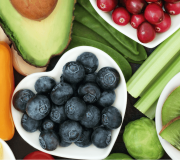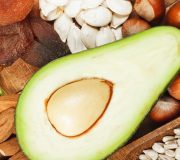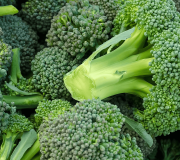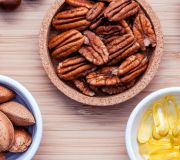Breaking Down Kale and Brussels Sprouts
“Superfoods,” “powerhouse,” or however else they are touted, kale and Brussels sprouts are undeniable leaders of the pack when it comes to nutrient and phytonutrient density. Kale and Brussels sprouts are two closely-related members of the Brassica family, often referred to as cruciferous vegetables. Close cousins include broccoli, cauliflower, and cabbage. Despite what the title may suggest, there is no reason not to enjoy both kale and Brussels sprouts on a regular basis. The new plant foods are boundlessly rich with many nutrients and phytonutrients.
Kale Health Benefits
Like other cruciferous vegetables and dark leafy greens, kale is rich in vitamins A, K, and C, folate, potassium, calcium, magnesium, and fiber. Including kale in the diet may actually improve nutrient absorption, as the prebiotic fibers support gut health. Despite its recent popularity, researchers still regard it as an “understudied” vegetable.
Kale Nutritional Info
Kale is high in carotenoid phytonutrients and is among the highest sources of lutein, an important carotenoid for eye health, which has been found to reduce the risk for glaucoma.1 Other phytonutrients in kale include chlorophyll, myrosinase, glucosinolates, beta-carotene, flavonols, and lignans.
There are many different types of kale, and while all are varieties are considered superfoods due to their nutrient density and phytonutrient content, their levels of sulfur-containing glucosinolates (the precursor to sulphoraphane) can vary by up to 10-fold. One particular study found that curly-leafed kale and Lacinato varieties (sometimes called Tuscan black kale and dinosaur kale) contained particularly high levels of glucosinolates as compared to other types of kale.
Kale’s potential health benefits are impressive, regardless of how it is consumed. For example, five ounces of kale juice per day for three months has been found to increase high-density lipoprotein (HDL) cholesterol and lower low-density lipoprotein (LDL) cholesterol in men with high cholesterol. Steaming kale appears to improve its ability to lower cholesterol by binding to bile acids in the digestive tract., Whether raw, juiced, or steamed, kale is an emerging superfood that one study referred to as “potentially one of the most healthiest foods in terms of nutrient value.”
Brussels Sprouts Health Benefits
Like their brassica brethren, phytonutrients in Brussels sprouts support detoxification and anti-inflammatory pathways, and they may offer cancer and heart disease protection. They have the highest amounts of total glucosinolates, which makes them valuable in the diet for their health benefits.2 Like kale, the health benefits of Brussels sprouts include their ability to bind to bile acids and lower cholesterol; this effect is enhanced when steamed. Interestingly, one and a quarter cups of Brussels sprouts has been found to stabilize white blood cell DNA the day after consumption. Because Brussels sprouts, like all cruciferous vegetables, contain goidrogenic compounds, researchers have studied the effect of consuming Brussels sprouts and observed no negative effect on thyroid function.3
Are Brussels Sprouts Good for You?
Yes. Brussels sprouts are the most commonly consumed cruciferous vegetables worldwide. Brussels sprouts are a great source of vitamins K and C, folate, manganese, carotenoids, and fiber, as well as omega-3 fatty acids, which adds to their anti-inflammatory benefits. Brussels sprouts are high in the flavonoid kaempferol, which was found to be a potent free radical scavenger and is protective against oxidative stress.4 The anti-inflammatory effects may even provide protection against inflammation in the brain. In mouse studies, kaempferol showed significant protection against the formation of amyloid beta mediated neurotoxicity.
Despite being the most commonly consumed crucifer, many object to Brussels sprouts because of their strong smell. To best enjoy Brussels sprouts, it is important not to overcook them. Overcooking Brussels sprouts will produce an unpleasant sulfur smell.


















